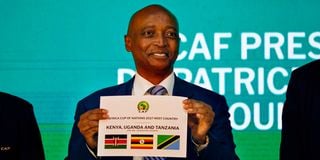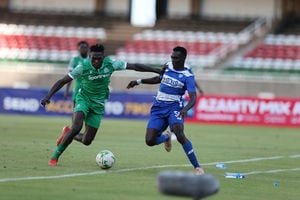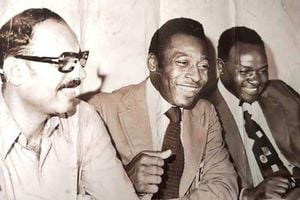
In this February 1996 picture, the then newly elected KFF chairman Peter Kenneth (right) and secretary general Sam Nyamweya are seen together after their election victory.
Peter Kenneth speaks very softly. So much so that a first-timer talking to him will have to lean forward and say ‘pardon’ time and again.
As we sit in his well-appointed office I am somehow reminded of a wizened doctor patiently trying to tell his patient the implications of the diagnosis he has just delivered.
Or the most favourite uncle a teenager runs to with the ubiquitous youthful delinquencies.
However, it soon comes out that the man has some humour in his bones as when we are sharing our ‘mtaa’ background stories, we laugh when we realise that our beloved fruit back them zambarau or zambaa (a kind of plum) only grew in particular (more affluent) estates in the city.
But there is no joking when Kenneth speaks of the gargantuan task facing Kenya ahead of the 2027 Afcon which the country is co-hosting with neighbours Uganda and Tanzania.
“What I can say is that we are already late if we seek to make an impact at the tournament. As we are speaking Harambee Stars coach should have already assembled a team that will take part in the tournament. The least I expected was for such a coach to be scouring the countryside looking for the young men who will do duty for the nation at the next Afcon,” he says.
As someone who has been there and done that, it is imperative that the writer -- and hopefully the whole country -- sits up and listens when Kenneth talks.
His tenure as the top mandarin at the Kenya Football Federation saw him prove that he is not all talk and no hat.
Even earlier on, Kenneth’s love for the game of football saw him take the sport seriously while a student at Starehe Boys Centre.
He later turned out for Provincial (now UAP) in an inter-insurance firms tournament. He also played for his estate team, Bahati FC.
The wanderlust later saw him land on his feet at the top tier club Re-Union as a goalkeeper. By this time he was in his Advanced levels of high school education.
His life as a shot-stopper for Re-Union came to a screeching halt, thanks to a career-killing injury to his left wrist.
There is a protruding crooked bone on the wrist, a life-long companion to Kenneth and a reminder of the good old days between the sticks.
He would later transition to sports management and was elected chairman of Re-Union.
“My main reason for taking up this position was because I wanted to champion players’ rights. I had seen first-hand how lack of money impacted the players -- lack of equipment like uniforms and boots, lack of money to pay allowances and other forms of motivation.”
At Re-Union Kenneth was at the mercy of well-wishers to whom he would go begging cap in hand every weekend.
As a former player and now a club chairman, he knew building a team on such an undertaking was to build on quicksand if ever there was a perfect example.

President William Ruto (center), Youth Affairs, Sports and the Arts Cabinet Secretary Ababu Namwamba (left) and Football Kenya Federation president Nick Mwendwa during the unveiling of the Pamoja bid for the 2027 Africa Cup of Nations at State House, Nairobi on May 15, 2023.
The experience earned on the pitch as a player and later in the boardroom would be the sole propulsion fuel for Kenneth’s interest in leading the Kenya Football Federation.
He took over the mantle in February 1996 after the incumbent Joab Henry Onyango Omino decided not to defend his seat.
“I ran against Omino’s Secretary General Sammy Joel Obingo and defeated him,” Kenneth says, a faint smile of satisfaction momentarily crossing his face.
Are there lessons to be learnt from his tenure at KFF?
Plenty, Kenneth asserts. First, it is important to note that the new team came into office at a crucial time in the country’s sporting history.
“We came to office about the same time the government had decided to stop giving funds to sports associations. So we were basically on our own. We had to look for viable means of raising funds or we were going to sink,” he says.
A few years earlier Kenyans in the length and breadth of the country -- from Mandera to the North to Vanga to the south and Liboi to the east and Lwakhaha to the west had risen up in a joyful celebration after the nabobs in Cairo running the show at CAF decided that the country was ripe enough to host Afcon, the first time ever the prestigious show was coming to town in this our East African neck of the woods.
This was not to be. With the government shouting itself hoarse saying ‘hakuna pesa!’ CAF took the championship to South Africa.
The compatriots of Nelson Mandela, having gotten their independence just two years earlier were dying to have something like Afcon to add to their celebrations and Kenya bailing out was godsend.
Compounding Kenneth and his team’s trouble was the fact that referees had gone for months without being paid their allowances and fans had developed total apathy to the local game.
“We had to move very fast and turn around this situation,” Kenneth says.
Many have always argued that it is important to elect people with grey matter in between their ears as sports administrators. Lots of it.
Kenneth, probably drawing form corporate experience decided to come up with a model never seen in Kenyan football before.
He approached various corporate entities asking for their support to run football.

President of the African Confederation of Football, Patrice Motsepe, announces the host countries for the 2027 Africa Cup of Nations during a ceremony held in Cairo on September 27, 2023.
Probably because of a good name he had in the local corporate scene, strong friendships, good luck or the simple old way of going to the cross of Jesus with prayers, Kenneth hit pay dirt when big companies decided to send money to his new and untested venture.
“Through my contacts, Kenya Breweries Limited, SmithKlineBeecham and BAT came on board and gave us money. We used this to sponsor the league and also to pay players allowances plus prize money for the winners. In a funny turn of events we were paying TV stations to air our matches live instead of the normal practice where TV stations are supposed to buy the rights.”
There had been a debate that airing the matches on TV might affect stadium attendance but Kenneth says these turned out to be unfounded because Kenyans trooped back to the stadium, especially in matches involving Harambee Stars.
So much so that at one time MISC was banned because of admitting fans well beyond its capacity.
This was especially on the days the late President Moi would come to the stadium and order the gates open for free entry.
Another important thing that should be emulated was the establishment of Youth Centres by way of funding from the German government.
The funding took care of equipment, pay for a seconded coach and other incidences.
“We saw the explosion of new talent all over the country from these centres,” Kenneth nostalgically notes.
The accountability he established so impressed the donors that soon KBL funded Harambee Stars to the tune of 30 million shillings while Eveready Batteries donated a bus to the team.
Kenneth believes sponsors can come to football but only if accountability is enhanced and crowd control put in place.
When his term came to an end after four years, Kenneth called it a day, keeping the promise he had made when ascending to office.
“Some claim that I used KFF as a stepping stone to politics. The fact is, I was already a politician when I came to KFF and I was honouring my promise to do a single term,” he says.
We end our interview and although he does not emphasise the fact, to me one of the biggest achievements the man attained was that KFF was not owing anyone a single coin.
In fact the federation Kenneth left has a balance of Sh11 million in its coffers. Now go ahead and show me how many Kenyans have left public office with a healthy bank balance.









